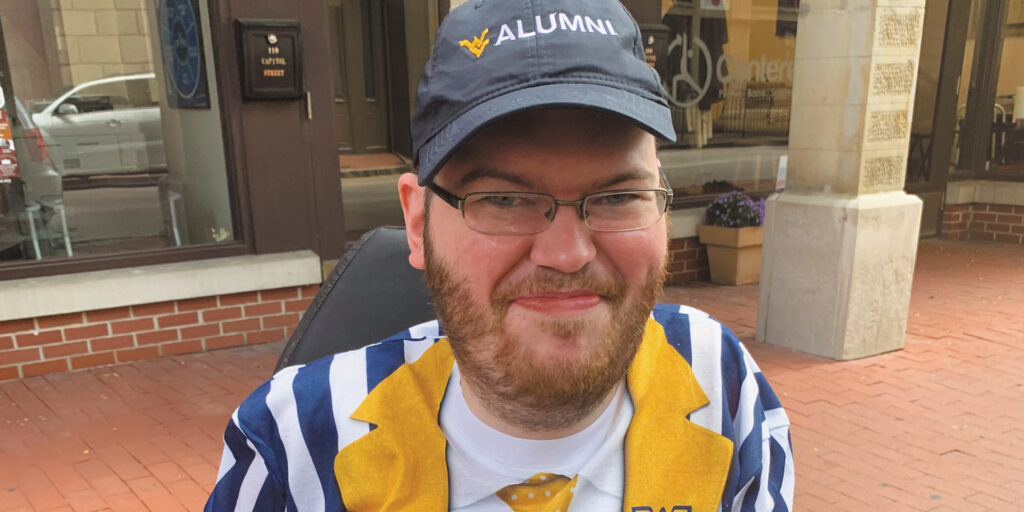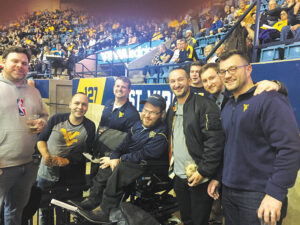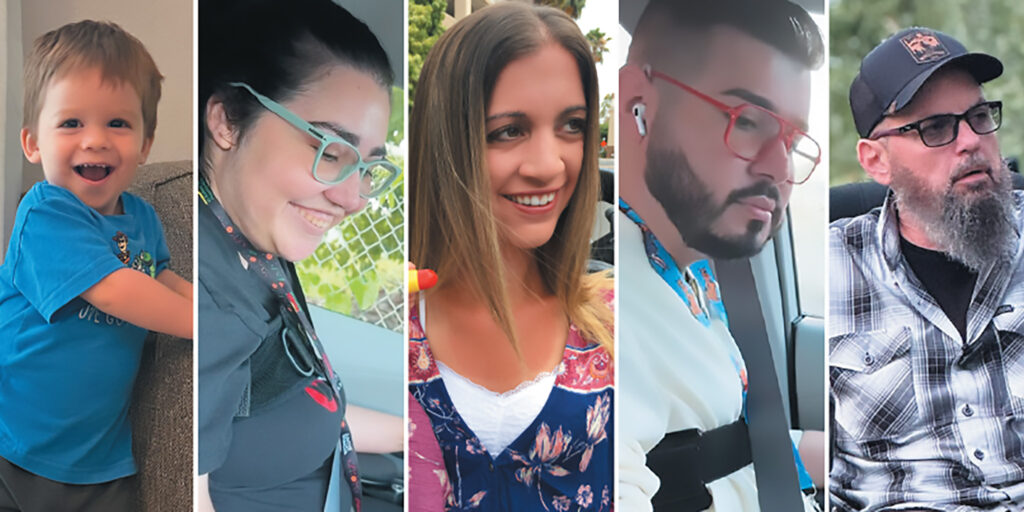
From Classroom to Courtroom: How Eric Arnold Navigated Accessibility in His Education and Career
By Rebecca Hume | Friday, November 14, 2025
5 Second Summary
Quest for Success explores the different paths that individuals with neuromuscular disease have taken to reach their potential and pursue dreams. This series spotlights individuals from our community and shares their journey to independence and accomplishment.
Eric Arnold has built his life around sharing his skills and expertise with others — and embracing opportunities to show the world what he brings to the table.
The 39-year-old, West Virginia-based attorney attributes his success to recognizing his own capabilities, working hard to reach his potential, connecting with others, and asking for accommodations.

Eric and friends at a WVU basketball game
Early life lessons
Eric was diagnosed with spinal muscular atrophy (SMA) at 18 months old. He began using a manual wheelchair when he was 3 years old, switching to a power wheelchair before second grade. Throughout his early schooling, he rode an accessible school bus, had access to a bathroom where he could transfer himself, and used a table instead of a school desk to accommodate his wheelchair. He excelled academically and socially and learned how to advocate for himself.
“I realized early that I had the natural ability to appeal to others and connect with them. Whether it was a teacher or a classmate, I knew if I wanted to be independent, I needed to not only accept help but also give back to people like they gave to me,” Eric recalls.
Being involved in the development and execution of his Individualized Education Program (IEP) also taught Eric a valuable lesson about asking for what he needed to excel. He credits his public school system with actively meeting his needs and creating an inclusive environment.
Chasing the college dream
Eric set out for college to find a profession he could thrive in and achieve financial independence. First, he researched financial aid programs, resources, accommodations, and accessibility at several universities. He recommends that anyone interested in college reach out to schools’ accessibility offices to learn about the support and accommodations they offer for students with disabilities.
Eric attended West Virginia University (WVU), where he earned a bachelor’s degree in journalism, a Master of Business Administration, and a law degree. Eric believes that a large part of his success stems from understanding his own worth.
“I think that one of the hardest things for people like me, who live with a disability, is struggling with this defeatist idea that your worth won’t be recognized. Whether it is communication or facing barriers or losing out on an opportunity, that mindset and those challenges can be very hard to overcome,” he says. “The way to face those pitfalls or mental blocks is by finding what you can do well and pursuing opportunities through that.”
Leaning into work accommodations
Eric recalls a conversation with his boss while interning at Hendrickson and Long, the law firm where he now works. Eric’s boss overheard him turn down a coworker’s offer to help with a task and told Eric, “Nine out of 10 times, someone offering to help you wants to be part of your life and sees value in you.” Eric realized that accepting help at work allows someone to be part of his experience and fortify his talents.
Now entering his 12th year as a litigator, Eric splits his time working from home and the office, sometimes attending courtroom hearings by telephone or Zoom when judges allow it. Eric is upfront with new clients that his physical limitations will not compromise their representation.
“Ask for help if you need it,” he says. “Ask your office or state programs for assistive technology. Ask your employer for accessibility accommodations. As long as you approach it in a way that shows these things will help you contribute, and by doing so, you are going to add intrinsic and external value to where you work, most employers are eager to oblige.”
Living independently
Eric lives in a condominium where he can commute by wheelchair a couple of blocks to his office and the courthouse. He also has a modified van that caregivers drive.
Eric balances earning an income and remaining eligible for benefits. He has caregivers through his state’s Medicaid waiver program and private pay. He is also enrolled in a work incentive program through Medicaid. He closely monitors his income, assets, and spending each month to maintain eligibility while working.
“My position is not salaried, so I work as much as I need to each month and monitor my income to stay under the amount needed to qualify for my benefits,” he says. “If I have a really busy month, then I spend money on something I need that qualifies as a write-off. I set up my own special needs trust. While I don’t have full access to that money, I can request it for qualified spending, and I can deposit money into it to stay within requirements.”
Eric enjoys advising others on how to navigate programs that allow people with disabilities to maintain independence and achieve success. Finding value in helping others and accepting help when needed has propelled him on his quest for success.
To others on that same quest, he says: “There are avenues to get where you want to go. There is always a way to open the door for yourself. It may not always look exactly how you want it to look. You may need some help, but you can do it.”
Rebecca Hume is a Senior Specialist and Writer for Quest Media.
Next Steps and Useful Resources
- Read how people working with disabilities cope and find resources in Ready to Work: How People with Disabilities Balance Benefits and Employment.
- There are many paths to success in the neuromuscular disease community. Read more Quest for Success
- Stay up to date on Quest content! Subscribe to Quest Magazine and Newsletter.
Disclaimer: No content on this site should ever be used as a substitute for direct medical advice from your doctor or other qualified clinician.




